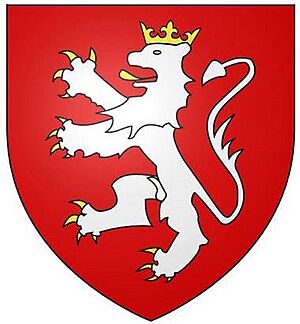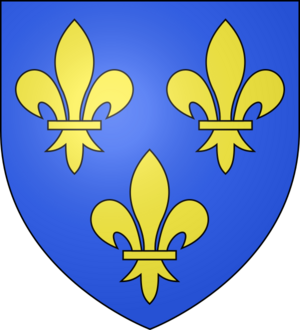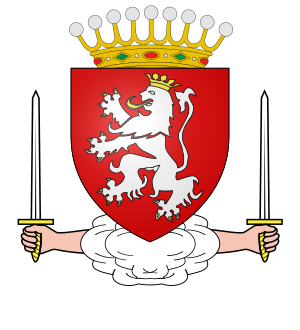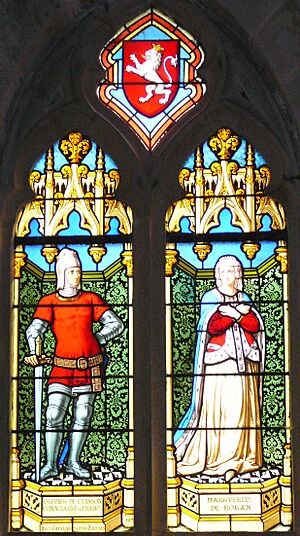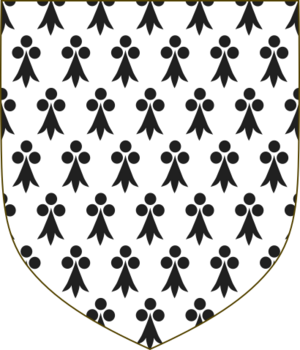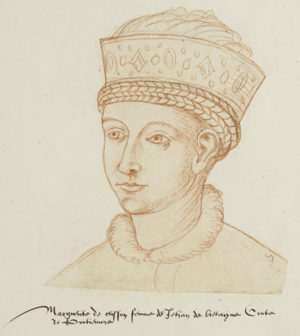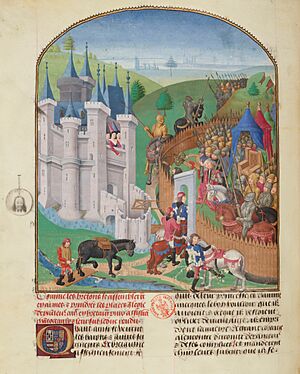Olivier V de Clisson facts for kids
Quick facts for kids
Olivier Le Vieux de Clisson,
Olivier V de Clisson, |
|
|---|---|
| Constable of France | |
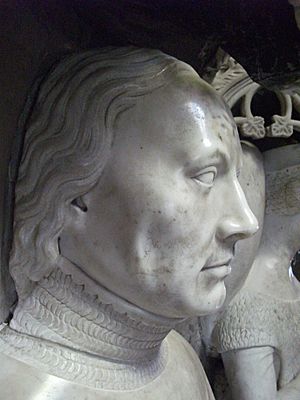
Detail from Olivier's tomb
|
|
| Born | 23 April 1336 Château de Clisson, Brittany |
| Died | April 23, 1407 (aged 71) Josselin, Brittany |
| Buried | Chapel at Josselin Castle |
| Noble family | de Clisson |
| Spouse(s) | Catherine of Laval and Chateaubrian; Maguerite de Rohan |
| Father | Olivier IV de Clisson (Breton Lord) |
| Mother | Jeanne de Clisson |
Olivier V de Clisson (born April 23, 1336 – died April 23, 1407) was a famous Breton soldier. He was sometimes called "The Butcher" because of his tough fighting style. Olivier's father, Olivier IV, was executed by the French king in 1343. This happened because the king suspected he had helped the English take the city of Vannes. This event deeply affected Olivier and his family.
Contents
- Olivier's Early Life and Family
- Olivier's Role in the Breton War
- Olivier Changes Sides
- Joining the French King
- Brittany's Debt and Exile of Duke John IV
- Olivier as Co-Regent of Brittany
- Olivier's Second Marriage
- Constable of France
- The Second Treaty of Guérande
- Flanders Campaign
- Daughter's Marriage
- Plan to Invade England
- First Assassination Attempt
- The "Marmousets" Government
- Heir to Brittany
- Second Assassination Attempt
- Seeking Refuge in Brittany
- Reconciliation and Protector of Brittany
- Death
- Olivier's Children
- Olivier's Wealth
- See also
Olivier's Early Life and Family
Olivier de Clisson was born on April 23, 1336, at the Château de Clisson in Brittany, a region in France.
A Family's Difficult Past
Olivier's father, Olivier IV, supported the King of France during the Breton War of Succession. He was defending the city of Vannes when the English attacked it in 1342. Olivier IV was captured by the English but was released after a small ransom was paid. This low ransom made the French King Philip VI suspect that Olivier IV had secretly worked with King Edward III.
After a peace treaty was signed, Olivier IV was invited to Paris. But he was arrested, put on trial, and executed by beheading on August 2, 1343. This quick execution surprised many nobles because the reasons for his guilt were never made public. After his death, his body was also publicly shamed.
Growing Up on the Sea and in England
Olivier's mother, Jeanne de Clisson, promised that Olivier and his brother Guillaume would get revenge for their father. She gathered money to create an army to fight French troops in Brittany. Later, she even armed ships and began attacking French ships at sea. These ships were eventually lost, and Jeanne and her two sons were stranded at sea for five days. Sadly, Guillaume died from thirst and cold. Olivier and his mother were finally rescued and taken to Morlaix.
After these events, Olivier went to England with his mother when he was young. He grew up at the court of King Edward III, alongside John IV de Montfort, who would later become the Duke of Brittany. Olivier's mother, Jeanne, later married an English military commander.
Olivier's Role in the Breton War
When Olivier was twenty-three, he returned to Brittany in 1359. He was with King Edward III and John IV de Montfort. They led a combined Breton and English force in a guerilla campaign.
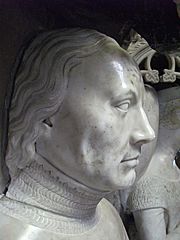
The Treaty of Brétigny
In 1360, Olivier made peace with the French king, John II "The Good". This happened as part of the Treaty of Brétigny. This treaty aimed to reduce fighting between France and England. It also tried to fix the wrongs done to Olivier's family. The treaty officially restored his father's honor and gave his family back their noble rights.
Olivier's First Marriage
In the same year, Olivier married Catherine of Laval and Chateaubriant. She was an heiress from a powerful family. This marriage made Olivier a cousin to both sides fighting for the Ducal throne of Brittany. This connection opened up new opportunities for him. Olivier and Catherine had two daughters:
- Beatrice of Laval
- Margaret
The War Continues
By 1363, Olivier was still fighting alongside the Montfortists, who were supported by the English. He was one of their commanders when they tried to take Nantes.
The Battle of Auray
In 1365, the two opposing Breton armies met near the city of Auray. Olivier played a key role in this battle. He suggested a strategy that helped divide the troops of Charles de Blois. Charles de Blois was surrounded and killed in the fight. Bertrand du Guesclin, the French Commander, was captured but later released. This battle ended the Breton War of Succession. Olivier was injured and lost the use of one eye, which earned him the nickname "the one-eyed man of Auray."
The First Treaty of Guérande
After the battle, peace talks began. John IV was recognized as the only Duke of Brittany. Olivier was upset because John IV gave a castle and forest, which Olivier wanted, to an English commander. Olivier was very unhappy about this. Soon after, the castle was mysteriously burned down. In response, Duke John IV took away some of Olivier's land.
In 1366, Olivier was sent to Paris as an ambassador for Brittany. He was there to make sure the French King Charles V respected Brittany's independence.
The Battle of Castile
In 1367, Olivier fought with the English General Robert Knolles in the battle of Nájera in Castile. They faced French troops led by du Guesclin. The French lost, and du Guesclin was captured again.
Olivier Changes Sides
In 1369, Olivier began advising the French King on military plans. He helped plan a possible invasion of England.
Joining the French King
King Charles V eventually gained Olivier's full support by giving him properties in Normandy. Olivier traded these lands for the lordship of Josselin in 1370. A few months later, Olivier officially changed his loyalty. He signed a document that made the King of France the ruler over Josselin, even though it was in Brittany. Duke John IV was not happy about this.
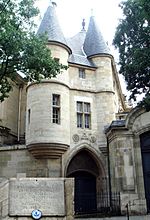
After getting Josselin, Olivier started building Josselin Castle in 1370. It was a large new fortress with eight towers. In the same year, he joined Bertrand du Guesclin, who was the constable of France. They fought together against the English, including the Siege of Brest in 1373.
In 1370, King Charles V asked Olivier to attack English-controlled areas in southwest France. On October 23, Olivier and du Guesclin defeated the English at the Battle of Pontvallain. They made an oath to share any gains from their victories. This alliance showed that loyalties could change based on what was best at the moment. Olivier became a supporter of the House of Valois, the family who had executed his father.
During an English raid near Paris, Olivier advised the King to use a careful defensive strategy. He said the French were not ready for a big battle. The English general was eventually turned away.
In 1371, the King of France decided to attack the English in their lands in Guyenne. The Constable and Olivier led the military efforts. Olivier attacked English positions in Poitou, Saintonge, and Anjou. The English fought back, capturing the stronghold of Moncontour.
In 1372, the English-controlled cities of Loudun, Saint Jean d'Angely, and Saintes were captured. The people of La Rochelle even opened their gates to the French troops. Olivier gained a reputation as a very tough fighter. Du Guesclin reportedly called him "the Butcher" because of his fierce actions against enemies.
Brittany's Debt and Exile of Duke John IV
Brittany owed money to the English King Edward III. Many Breton nobles, including Olivier, disliked that English advisors were in charge of the Duchy's finances. There was also growing unhappiness about a new ducal tax. Duke John IV signed a new alliance with England. He told France he had to host English troops to counter Olivier's presence in Brittany.
In response, King Charles V ordered the Constable in 1373 to take over the Duchy. He made sure Olivier supported this by giving him more land. Du Guesclin and Olivier started a campaign to turn Breton nobles against Duke John IV. Abandoned by most of his nobles, Duke John IV was forced to leave Brittany and went to England in April 1373.
Olivier as Co-Regent of Brittany
Olivier could have claimed the title of Duke, but King Charles V chose to give Brittany to his brother, the Duke of Anjou. However, this was mostly an honorary title, as the Duke of Anjou never actually entered Brittany. Olivier was then appointed to help govern Brittany as a co-regent with a Viscount, John I of Rohan.
From 1373 to 1377, Duke John IV returned to Brittany with English help. He tried to retake cities. Olivier built up military forces in southern Brittany. A truce between the Kings of France and England, however, stopped Olivier from using his full force. The siege of Brest lasted for several years. Olivier built a fortress to block access to the city by sea. At this point, Brest was the last city in Brittany held by the English.
In 1378, King Charles V decided to fully add Brittany to the Kingdom of France. This went against the Treaty of Guérande, which had promised Brittany's independence. This angered many Breton nobles. Olivier, however, remained loyal to the French king.
Duke John IV returned from exile and found support in Brittany. He reclaimed his seat in Brittany, except for the land held by Olivier, including Nantes.
Olivier's Second Marriage
In 1378, after his first wife died, Olivier married his second wife, Marguerite de Rohan (1330-1406). She was from another important noble family in Brittany. Through this marriage and other family connections, Olivier V became linked to the largest noble families in Brittany.
Constable of France
In 1380, after du Guesclin died, King Charles VI made Olivier the Constable of France on November 28. This was a very important military position. The Constable had the right to keep war loot, except for gold, silver, and prisoners. Olivier held this powerful office from 1380 to 1392.
The Second Treaty of Guérande
In 1381, a second Treaty of Guérande was signed. This treaty improved relations between Brittany and France. Duke John IV and Olivier signed a treaty of "good allies" in May 1381, which was confirmed again in 1382.
Flanders Campaign
In 1382, there was a revolt in Flanders against feudal power. King Charles VI of France decided to help his ally, the Count of Flanders. Olivier led the French Royal army to victory in the Battle of Roosebeke on November 27. The French troops were experienced and defeated the less experienced Flemish militias.
This Flemish uprising also led to a revolt in Paris, called the Maillotins uprising, in March 1382. The citizens were angry about a reinstated tax. King Charles VI's victory in Flanders and his return to Paris changed the situation. The Parisians chose not to fight the King. Olivier told them they had to choose between justice or mercy. They chose mercy, which meant paying a large sum of money.
Daughter's Marriage
In 1384, Olivier paid the ransom for John I, Count of Penthièvre, who was held captive in England. Olivier then arranged for his daughter Margaret to marry him. This was a strategic move, as John de Blois was a potential heir to the Ducal throne of Brittany if Duke John IV had no male children.
Plan to Invade England
In 1384, Olivier planned a huge project to invade England using a large fortified raft. Many ships were gathered for this very expensive operation. However, the plan was not successful. Delays, illness among supporters, and bad weather prevented the project from happening. It was finally abandoned in 1387.
First Assassination Attempt
In 1387, Duke John IV invited Olivier to a meeting in Vannes. On June 27, 1387, Olivier was seized and imprisoned. The Duke ordered that Olivier be thrown into the water in a bag. However, the Duke's weapons master did not follow this order. Olivier eventually agreed to pay a large sum of money and give Duke John IV some of his forts.
In 1388, the King of France helped Olivier get his confiscated lands back, but not the ransom money. This was done to avoid further conflict with the Duke.
The "Marmousets" Government
By 1388, King Charles VI, who was fifteen, decided to govern without his uncles. Olivier became part of a group that led the government. This period is known as the "government of the marmousets".
Heir to Brittany
In 1389, the King encouraged noble Breton families, like Olivier's, to seek the title of Duke of Brittany if Duke John IV had no male heir. However, Duke John IV did have a son, also named Jean, born in December.
Second Assassination Attempt
In 1392, an attempt was made to assassinate Olivier when he returned to Paris. Pierre de Craon attacked him in a narrow street. Olivier was saved by his chainmail armor. He fell from his horse and was knocked out. Believing him dead, Craon fled.
Seeking Refuge in Brittany
To punish Duke John IV and Craon, King Charles VI marched on Brittany with Olivier. But during this trip, the King suffered a mental breakdown. The King's uncles blamed Olivier for this. During the King's illness, his uncles regained power. Olivier was accused of illegally enriching himself and was banished from the Kingdom. He was fined and asked to return the Constable's sword. Olivier refused and sought refuge in his castle of Josselin in Brittany.
Duke John IV then besieged Josselin. However, by 1394, King Charles VI restored his trust in Olivier. Although others were appointed Constable, Olivier kept the privilege of holding the Constable's sword. By 1397, Olivier had also formed an alliance with Louis d'Orleans, the King's brother.
Reconciliation and Protector of Brittany
After thirty years of conflict, Olivier finally made peace with Duke John IV in 1396. They promised peace and friendship until death. This promise was kept, and the two men were at peace when Duke John IV died in 1399. The Duke's son was only ten years old. The King's brother, Louis of Orleans, suggested that Olivier should govern Brittany to prevent it from falling under English control.
Olivier's daughter, Marguerite de Clisson, sided with her husband against her father. She claimed the Duchy, which angered Olivier. He reportedly predicted that she would ruin her children. This prediction came true, as two of her sons were executed for treason, and a third was imprisoned for twenty-five years. A legend says that Marguerite broke her leg while fleeing her father, earning her the nickname "Lame Margot."
Death
Olivier de Clisson died in Josselin on April 23, 1407, at the age of 71. In his will, he expressed a wish to return the Constable's sword. He was buried in the chapel of Josselin Castle. His grave was later disturbed in 1793.
Olivier's Children
Olivier had two daughters with his first wife, Catherine de Laval.
- Beatrice (c. 1366–1448): She married Alain VIII de Rohan. Their son, Alain IX, married Margaret, a sister of John V. This branch of the Rohan family became very successful and inherited Josselin Castle.
- Marguerite (1366–1441): She married John, the son of Joan, Duchess of Brittany, and Charles de Blois. Marguerite tried to claim the ducal throne. She even kidnapped John V, the son of Duke John IV. She was defeated, and her property was taken by John V.
Olivier's Wealth
Historians have estimated that Olivier de Clisson was very wealthy. In 1400, his yearly income was around five hundred million Francs. His total fortune was estimated to be like six tons of gold and sixty tons of silver.
See also
 | Madam C. J. Walker |
 | Janet Emerson Bashen |
 | Annie Turnbo Malone |
 | Maggie L. Walker |


